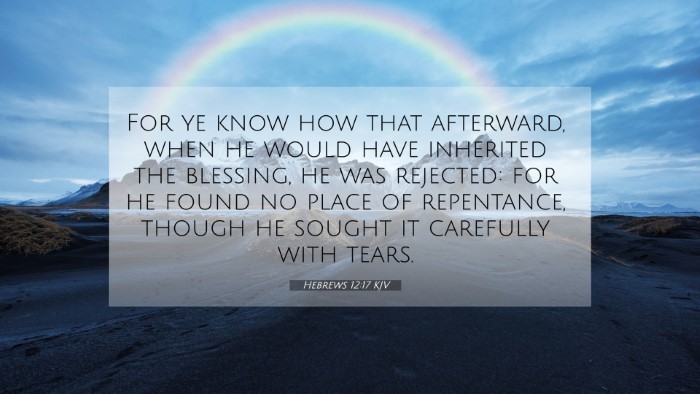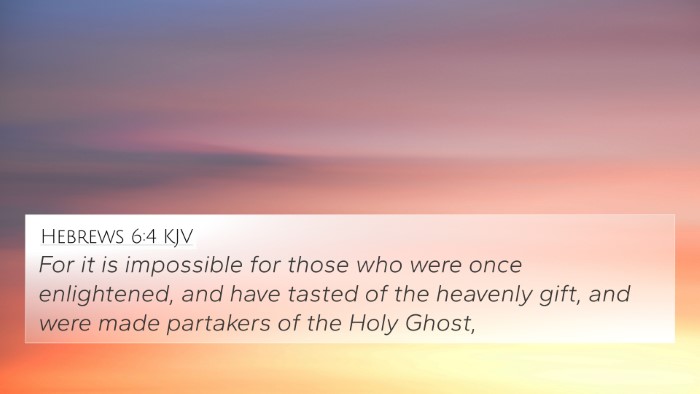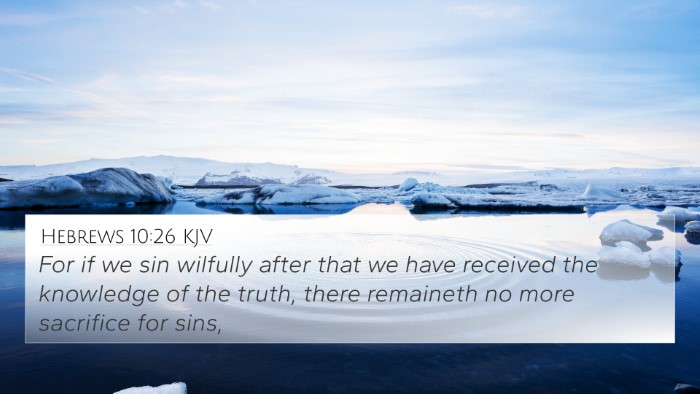Understanding Hebrews 12:17
Hebrews 12:17 (KJV): "For ye know how that afterward, when he would have inherited the blessing, he was rejected: for he found no place of repentance, though he sought it carefully with tears."
This verse serves as a cautionary reminder of the consequences of despising one’s spiritual inheritance, exemplified in the case of Esau. The author of Hebrews contrasts the transient pleasures of sin with the eternal blessings associated with faith and obedience.
Meaning and Interpretation
This verse illustrates the serious implication of Esau's actions, emphasizing that he lost his birthright and the consequent blessing due to momentary impulses. His regret, although genuine, was met with the permanence of the repercussions of his choices. The commentary insights help unpack this level of understanding:
- Matthew Henry:
Henry emphasizes that Esau’s choice to sell his birthright for a meal reveals the folly of trading spiritual treasures for temporal satisfaction. His tears signify a deep regret, but not a genuine repentance that leads to a change of heart.
- Albert Barnes:
Barnes notes that the rejection Esau faced was not solely due to the act of selling his birthright but also tied to his failure to appreciate the value of spiritual blessings. This serves as a warning to believers about the significance of their inheritance in Christ.
- Adam Clarke:
Clarke points out that Esau sought the blessing with tears, highlighting the emotional reality of his regret. However, Clarke underlines that the absence of a repentant heart meant that Esau's sorrow did not reverse his choices, therefore stressing the gravity of sin's consequences.
Cross-References
This verse connects significantly with several other biblical passages, enhancing the context of its warning:
- Genesis 25:29-34 - The account of Esau selling his birthright for a meal.
- Genesis 27:30-40 - The narrative of Jacob taking Esau’s blessing.
- 2 Peter 2:14 - A warning against following the example of Esau, characterized by greed and impure motives.
- Romans 9:13 - Paul's assertion that "Jacob I loved, but Esau I hated," signaling God's sovereign choice.
- Proverbs 10:22 - "The blessing of the Lord, it maketh rich, and he addeth no sorrow with it," contrasting the futility of earthly gains.
- Hebrews 11:16 - A reminder that believers seek a better heavenly country, hinting at the inheritance that transcends earthly troubles.
- Philippians 3:19 - Warnings against those who prioritize earthly desires over spiritual discernment.
Thematic Connections
The themes present in Hebrews 12:17—repentance, inheritance, and the consequences of choices—create a rich inter-Biblical dialogue. They underscore the importance of valuing spiritual blessings over temporal desires, a message resonating throughout scripture.
- Repentance: Explored deeply in verses like 2 Corinthians 7:10, which speaks of godly sorrow leading to repentance.
- Inheritance: Ephesians 1:11 speaks about our inheritance in Christ, contrasting with Esau's forfeiture.
- Consequences of Sin: James 1:15 speaks about how sin leads to death, a theme echoed in Esau's loss.
Conclusion
In summary, Hebrews 12:17 serves as a vivid reminder for believers to appreciate their spiritual heritage. The cautionary tale of Esau compels us to reflect on our values and choices, ensuring we do not trade eternal blessings for fleeting satisfaction. Through a comprehensive Bible cross-reference study, one may better understand the significance of this warning and apply it to one's life.
Tools for Further Study
For those delving deeper into the connections between scripture, utilizing a Bible concordance and cross-reference guide is highly beneficial. Engaging in cross-reference Bible study methods can enhance one’s understanding of similar themes across the scripture, providing a fuller picture of biblical teachings.
FAQs
What verses are related to Hebrews 12:17?
- Genesis 25:29-34
- Genesis 27:30-40
- 2 Peter 2:14
- Romans 9:13
How do Hebrews 12:17 and Genesis 25 connect?
Both passages address Esau's actions regarding his birthright, providing insight into the spiritual value of inheritance and the peril of momentary decisions.
How to find cross-references in the Bible effectively?
Using tools like a Bible concordance, thematic study guides, or apps dedicated to Bible study can facilitate identifying connections between verses.
Identifying connections between the Old and New Testament is particularly impactful, as it enhances understanding of the continuity and fulfillment of biblical themes.











